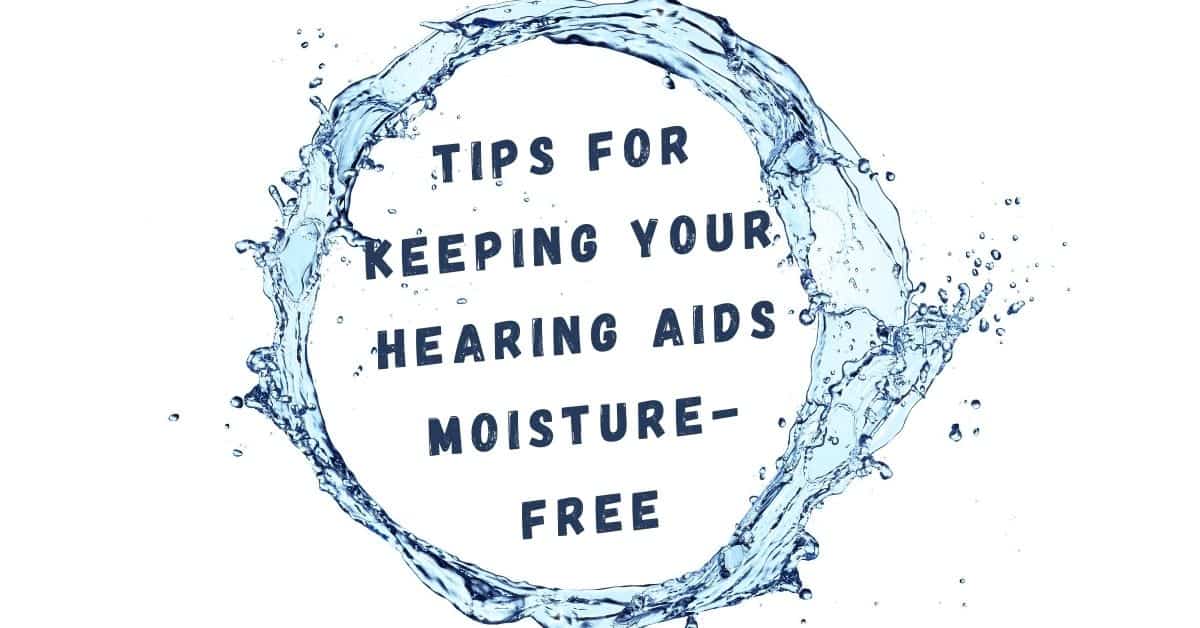
We all do our best to keep our hearing aids dry, but sometimes the unexpected happens. Maybe you’ve been caught out in the rain, accidentally stepped into the shower without taking off your hearing aids, or simply live in a humid city. Whatever the case may be, your hearing aids don’t like the damp. Here are some of our best tips for keeping your hearing aids moisture-free.
Moisture and Hearing Aids
Just like any electronic device, such as your phone or computer, hearing aids don’t like moisture. Frequent exposure to moisture without proper cleaning and drying can lead to corrosion or other damage. Your hearing aids may have trouble getting enough power, or start to glitch in other ways. When it comes to water damage, it’s not actually the water itself that harms your devices. Rather, it’s the tiny ions and impurities in the water. These impurities can connect to the contact points behind the battery, and interfere with the connection. When you turn on your hearing aid, it won’t work normally.
Keeping Your Hearing Aids Dry
You’d never leave your phone or your watch in the rain, and if your electronics got wet, you’d immediately dry them. The same goes for your hearing aids. It’s important to dry them every day because they’re often exposed to moisture. They may be exposed to sweat, earwax, and humidity. Your hearing aids have a moisture resistant coating to protect them from these daily sources of moisture, but you’ll need to dry them every day to keep your hearing aids in the best condition.
We recommend that you clean your devices every night when you take out your hearing aids before bed. First clean them with a dry cloth and remove any excess moisture, dirt, dust, or earwax. Next, open the battery door and wipe the battery and battery door with a dry cloth. You can leave the battery door open overnight so the hearing aid can dry thoroughly. It’s best to store your hearing aids in a safe place in your bedroom overnight. Leaving them in the bathroom can expose them to more moisture.
Hearing Aid Dryers
One of the easiest ways to dry your hearing aids is with a hearing aid dryer or dehumidifier. Many drivers use air to completely dry your hearing aids. You can also get hearing aids dryers that dry your devices with UV light. Not only will your devices be dry in the morning, they’ll also be completely sanitized.
You can even find hearing aid dryers that use desiccants. This is a great option if you need to dry your hearing aids but don’t have a power outlet nearby. Desiccants can be pellets or linings, and the desiccant will draw the moisture out of your hearing aid, so it will be completely dry by morning.
Before placing your hearing aids in the dryer, wipe them with a soft cloth to make sure they’re clean, then set them into the drying box. In the morning your devices will be totally dry. You can also use the dryer if you’ve been caught in the rain or if the hearing aids have gotten wet. It’s best to dry your devices immediately if they’ve been soaked. If you have rechargeable hearing aids, you can get a charging station that also dries your hearing aids.
Avoiding Moisture
Along with daily cleaning and drying, it’s a good idea to avoid getting your hearing aids wet whenever possible. One way to avoid moisture is to use a hearing aid sleeve. You can slip the waterproof sleeve over your hearing aids to keep them dry. If you’re playing sports, going for a jog, or think it will rain on your walk, a sleeve can protect your hearing aids from sweat and moisture.
Maintaining Your Hearing Aids
Your hearing aids can provide you with great hearing for a number of years. Maintaining your hearing aids with daily cleaning and thorough drying will extend the life of your devices and reduce the number of repairs you may need. The more you maintain and take care of your hearing aids, the better you’ll be able to hear. Clean and dry hearing aids provide the best sound quality and you’ll be hearing clearly for years.
